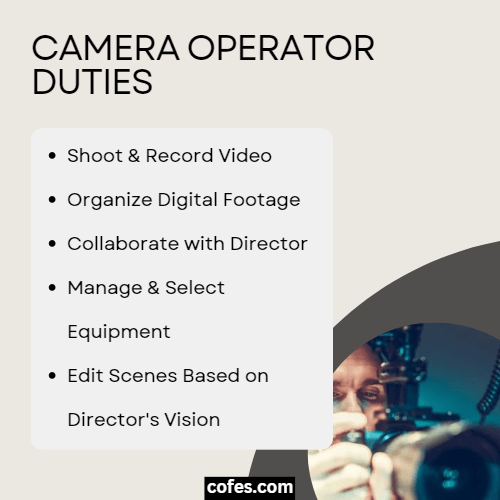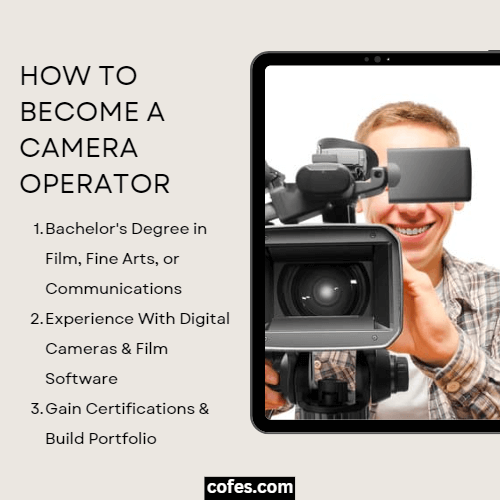Aside from capturing what is happening, the job of a camera operator encompasses other things in the audio-visual sector.
Anyone functioning in this part of the media is expected to know at least a little about other aspects of visual productions.
Sought out by film production houses, TV stations, and cable companies, camera operation is one of the most lucrative skills that is highly recommended for youth, especially those that are chasing a new career but haven’t figured out what they want.
Camera Operator Information
| Official Job Title | Camera Operator |
| Average Salary | $54,799 |
| Stress Level | Average |
| Work/ Life | High |
| Job Satisfaction | High |
| Career Advancement | Average |
Camera Operator Job Description
Who Is A Camera Operator?
He is a person employed to handle a video camera for the recording of an ongoing happening.
This person is someone who’s behind the camera either at a film location or studio for either the shooting of a documentary or the recording of news programs.
Generally, a camera operator is equipped with at least an audio-visual recording device to film footage for projects that would later be edited in a way that appeals to content consumers.
What Does A Camera Operator Do On A Daily Basis?
The daily responsibility of a camera operator differs.
With technology advancements amongst other workability dynamics that relate to the new media, a camera operator’s jobs vary but include the following:
- Liaise with film/program directors to discover the overall visual concept of an idea.
- He assists the product crew in determining the appropriate set.
- A camera operator studies the film script and maps out how to make the best out of it.
- He sets up the production equipment needed for a shoot.
- He works in collaboration with other production departments, like lighting and sound, to record valuable footage.
- A camera operator also frames and creatively captures footage for editing purposes.
- While supervising her assistants, she also delegates tasks to them.

Responsibilities, Duties & Roles Of A Camera Operator
A camera operator would often find himself operating a different kind of camera.
Amongst the variety of audio-visual devices, she manages handheld cameras mounted on a tripod and a drone.
Most camera operators own their equipment, and when they find themselves hired, they are responsible for taking care of the production kit.
A camera operator is also expected to know how to function in other production departments like lighting and editing.
Camera Operator Salary
Camera operators earn differently because of their job descriptions and deliverables.
Several factors determine the takehome for a camera operator, some of which are -distance and social class.
However, below are what she earns on an annual basis in a country like the United States.
Average Salary
According to Career Explorer, a camera operator in the United States earns $54,799 per annum average salary.
Starting Salary
For beginners, the starting level salary is usually $45,691 per year in the United States.
Senior Salary
A camera operator in the United States earns as much as $87,336 salary every year.
How To Become A Camera Operator
The Entry Level: Certification, Training & Degree
A camera operator would usually study mass communication, filmmaking, cinematography, photography, multimedia, and photography.
There are several other educational requirements for this job.
A camera operator is to have either a bachelor’s degree or an associate’s degree.
Having secured any of those, experts advise that she take professional courses seriously for the sake of innovative ideas, knowledge about state-of-art technologies, and an up-to-date approach to production.
Aside from a tertiary institution’s bachelor’s or associate degree that a camera operator would typically have, it will do him good to have certifications like Certified Television Operator (CTO) and Operator Certification.
Other Skill Sets, Requirements & Qualifications
Having gainfully acquired production knowledge from school or hands-on experience, there are skill sets a camera operator should know, amongst which are camera movement, frame composition, and lighting.
For one considering the advancement of career knowledge, she can consider studying camera shooting techniques, film, and digital camera operation, amongst others.
How Long Does It Take To Become A Camera Operator?
Because a bachelor’s degree is not compulsory to have before becoming a professional camera operator, one may know the job via an associate’s degree, training/apprenticeship, or internship.
So typically, it takes between two to four years before becoming a camera operator.
Is It Hard To Become A Camera Operator?
Becoming a camera operator is not as hard as one may think it is. As one may have seen in most cases, those who tolled this career path enjoy the technicalities attached to the job, which makes doing it easy.
Career Path for a Camera Operator
The Camera Operator Roadmap
To explore a camera operation career path, one is most likely to start in a junior position like a trainee, camera assistant, and technical operator.
Although, this would be after one has bagged a bachelor’s degree or associate degree from a tertiary institution.
As time goes on, one would, however, progress from there.
Projections For Growth
This is a kind of job that has no limit or restriction to how far one can go.
The truth is that as a camera operator, one may be an expert in other production areas like video editing, amongst others.
However, having gone to a tertiary institution for study, a camera operator would, in most cases, take internship programs to have the practical experience of what she set out for and to build her portfolio.
In this field, employers don’t care much about tertiary institution qualifications.
What they are most concerned about is the deliverables of whoever would be engaged.
And in this profession, growth is a continuum (almost daily, there are new things and new production equipment to learn).

Is Being A Camera Operator A Good Career Path?
Exploring this career is one of the most fulfilling jobs in the modern century—all thanks to the respect it commands for its professionals.
And if you are someone who likes being in the background but admires being around the action, camera operation is a unique career choice you might consider.
Camera Operator Working Conditions
Can A Camera Operator Work Remotely From Home?
Usually, a cameraman is engaged to be physically available for shooting documentaries, events, films, or the recording of news programs, as the case may be.
Technically, a camera operator is one-shouldered with the responsibility of taking care of studio/production equipment and capturing film and news program directors’ shots.
Hence, her physical presence, in most cases, is a necessity.
How Many Hours Does A Camera Operator Work?
If employed by a government parastatal, a television station, a film studio, or a creative agency, a camera operator would usually work at the regular 40 hours.
Can A Camera Operator Work Part-Time?
While her working hours depend on the mode of engagement and deliverable requirements, a camera operator can choose to work as a part-time staff member of a corporate body or film project.
For instance, an Electronic News Gathering (ENG) firm may seek the service of a camera operator just for the coverage of live events.
In this situation, she would only be called when there is a live event to cover.
What Are The Average Vacation Days Of A Camera Operator?
If you are hired as a full-time camera operator, you are entitled to an annual leave of around ten days in countries like the United States.
Alternative Careers & Similar Jobs to a Camera Operator
- Director of Photography
- Film Editor
- Sound Engineer
- Film Producer
- Multimedia Artist
- Screenwriter
- Content Creator
- Web Designer
- Communications Director
- Supervisor
- Engineering Technician
A Camera Operator’s Resume Tips
Camera handling typically requires some technicalities and skills, which should beautify one’s resume as an operator.
Your potential employer is likely not interested in the type of school you went to or your course of study.
But what is most likely going to create your interest in him is your experience and working portfolio, which should be what your resume entails.
So, below are some of the tips for drafting a mind-blowing resume as a camera operator, including the following:
- Take pride in expressing your working portfolio.
- Identify the most in-demand production skills in the labor market, and list them if you have them.
- List out your quantifiable accomplishments.
- Explain how your potential employer can benefit from your wealth of experience.
- Let your resume be creatively designed for visual appeal.
- Use production terminologies while explaining your experience and production skills.
Camera Operator Interview Questions
Q1: Succinctly explain what telephoto lenses are used for…
Why it works: A potential employer would want to be sure that you know your onions as they relate to the handling of the camera.
So, this question would make him realize that you know the kind of camera equipment that you would need to capture certain events.
Q2: What type of equipment would you prefer to use between analog and digital?
Why it works: Although it would most likely not happen, imagine being interviewed by a company where all their equipment is analog, and you are a digital camera handler, you may not be considered for the job.
So, they must have an idea of where you are more skillful.
Q3: Can you direct a production concept?
Why it works: Most employers would prefer to engage a camera operator that can also produce an audio-visual concept in the case where a film director is unavailable.
With this question, they (the potential employers) would discover if you are knowledgeable about lighting, editing, and sound, amongst others.
Jobs Related To Camera Operator
- Broadcast technician.
- Sound engineer.
- Video and film editor.
- Multimedia producer.
- Lighting operator.
- Film director.
- News program director.
- Film/program producer.
- Studio manager.
- Production procurement manager.
- Motion graphics designer.
- Production crew manager.
For HR Managers: Tips For Hiring A Camera Operator
Key Characteristics To Look For In A Camera Operator
Given the modalities camera handling entails, an HR person is advised to ask the following questions before being a camera operator on board during a recruitment process:
- Is she tech-savvy?
- Is she physically fit, and can she endure standing for long periods?
- Does she have an eagle eye?
- Does she pay attention to details?
- Are her technical skills tailored to the needs of a hiring company?
Minimum Level Of Education & Experience
Although a camera operator needs to have a bachelor’s degree or associate degree, it is not a necessity for one’s professionalism.
However, the minimum experience to have is an internship.
References
- https://www.careerexplorer.com/careers/camera-operator/salary/
- https://90seconds.com/what-is/camera-operator/
- https://www.prospects.ac.uk/job-profiles/television-camera-operator
